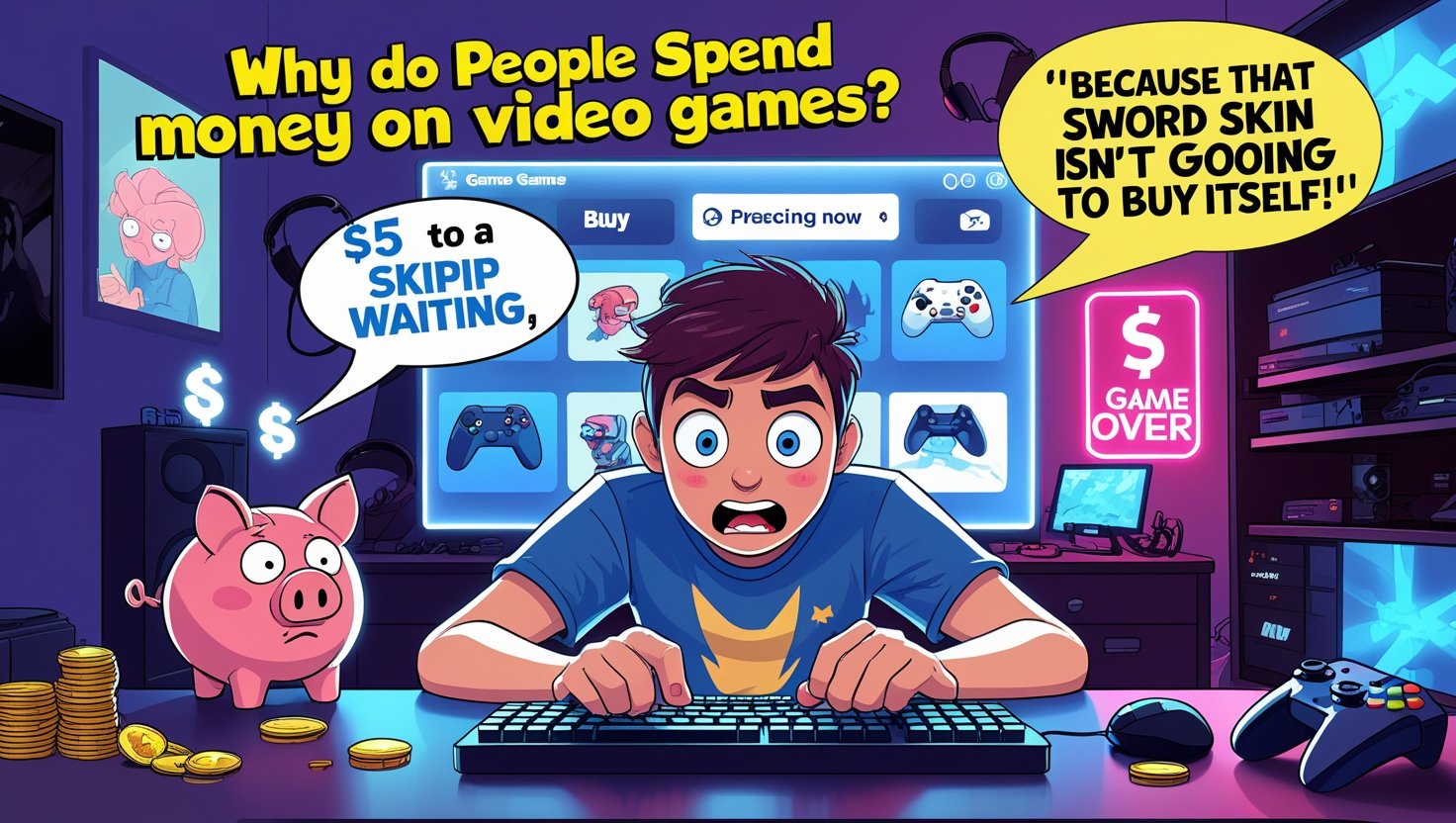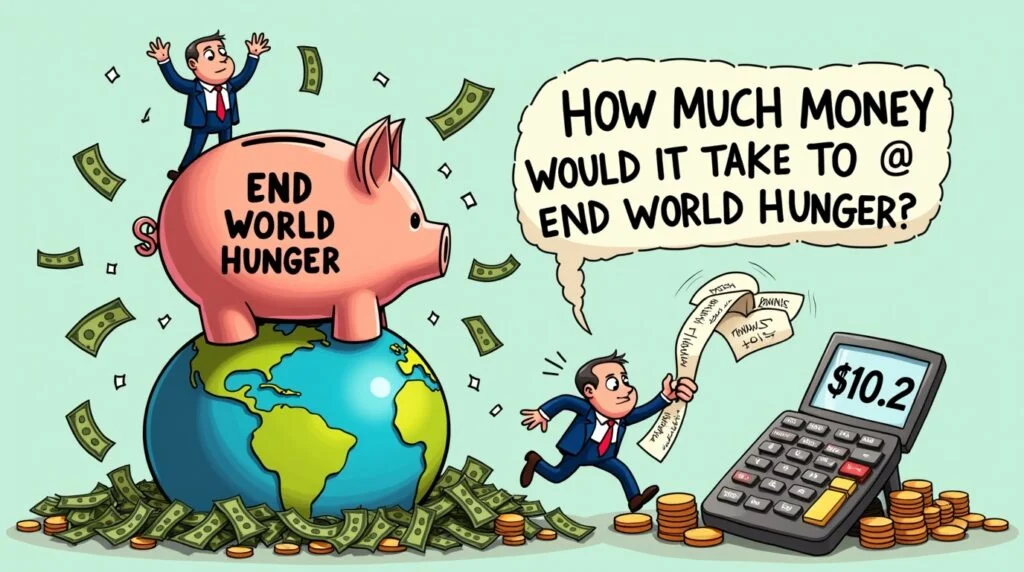People don’t just play video games. They live in them. Hours. Days. Weeks. Digital universes more real than real life. And in those universes? Money is king.
Every year, billions of dollars disappear into the void. Not for food. Not for shoes. Not for anything that exists outside the screen. Just pixels. Data. The high of clicking “Purchase” and watching the game world bend to your will.
You tell yourself it’s just a few bucks. A skin here. A power-up there. Then your bank statement arrives, and suddenly, you’re wondering if maybe you really needed that limited-edition, flaming, gold-plated battle axe. But why? Why do people spend money on video games? Because games are designed to make you spend. And they’re very, very good at it.
Also Read: How Much Money Would It Take to End World Hunger
The Big Business of Video Games
Once upon a time, you bought a game. You played it. You finished it. The end. Now? Games are free to start. But free is a lie. Free is bait. The hook comes later.
Want your character to stop looking like they got their outfit from a thrift store dumpster? That’ll cost you. Want a weapon that doesn’t feel like you’re fighting with a pool noodle? Pay up.
Want to skip the painfully slow grind designed on purpose to make you hate your life? That’s a special offer just for you.
Video game companies don’t sell games anymore. They sell microtransactions. Tiny purchases, over and over, until your digital wallet is a skeleton. And you, the player, the consumer, the ever-willing test subject, happily press the Buy Now button. Again. And again. And again.
Why Do People Spend Money on Video Games?
Nobody thinks they’re going to spend money. Until they do.
Here’s why.
1. To Look Cool
The default character skin? An insult. Basic. Boring. Looks like the guy who gets eliminated first. You need style. A neon jacket. A glowing sword. A mask that screams, Yeah, I spent money on this game and I’m proud of it.
Does any of this help you play better? No. Does it make you feel better? Absolutely. People do this in real life, too. Expensive sneakers. Fancy watches. A $500 hoodie. But in games? You can’t spill ketchup on a digital outfit.
2. To Win Faster
The game dangles a prize in front of you. That legendary sword. That top-tier armor. It could be yours. All you have to do is play for 50 hours. Or, you know. You could just spend five bucks and get it now.
Some people call this pay-to-win. Others call it being efficient. Why struggle when your credit card can do the hard work for you?
Also Read: How Does Insurance Pay For Suicidal Deaths
3. Because It’s a Habit
Every time you log in, there’s a special deal waiting for you.
- Daily rewards. “Claim your free gift before time runs out!”
- Limited-time skins. “Only available for 48 hours!”
- Flash sales. “Once it’s gone, it’s gone forever!”
The game wants you to feel like if you don’t buy now, you’ll miss out forever. You don’t even really want that new outfit. But it’s exclusive. And what if, one day, you decide you do want it? And it’s too late? Might as well buy it now. Just in case.
4. Because Everyone Else Is Doing It
Picture this: You load into a game. Everyone has shiny armor. Everyone has glowing swords. Everyone looks like a battle-hardened warrior forged in fire and destruction.
Except you. You? You look like a lost tourist in cargo shorts. The fastest way to fix this? Swipe your card. Buy the cool armor. Join the cool kids. It’s not peer pressure. It’s social survival.
5. Because It Feels Like Gambling
Loot boxes. Mystery crates. Gacha pulls.
Here’s how it works:
- Pay money.
- Get a random prize.
- Hope for something rare.
- Probably get garbage.
- Try again.
It’s the same trick casinos use. The flashing lights. The “almost-won” feeling. The just one more try mentality.
A kid spending $10 on loot boxes and an old man pulling a slot machine handle? Same brain chemistry. Same dopamine rush. Same cycle. And just like in a casino, the house always wins.
Video games aren’t just about fun anymore. They’re about money. Players don’t spend cash for no reason. They do it to look cool. To win faster. To keep up. To chase the thrill.
And game companies? They know exactly how to make you spend. So the real question isn’t why people spend money on video games. It’s how much they’ll spend before they realize… They’re playing the game. But the game is playing them.
Also Read: Is American Amicable Life Insurance Legit
How Much Do People Spend?
The gaming industry makes more money than Hollywood. More than the music industry. More than your entire allowance times a million.
And it’s not from selling games. Not really. It’s from you. From your tiny, innocent, one-time purchases. That five-dollar skin. That ten-dollar battle pass. That loot box you swore was the last one.
Every year, players dump billions into video games. Not for new levels. Not for new stories. But for pixels. Digital outfits. Fake money that only exists in a game.
The numbers don’t lie:
| Year | Global Microtransaction Revenue |
| 2022 | $67.94 billion |
| 2023 (est.) | $76.66 billion |
Companies rake in cash. And you? You think you’re just buying something small. A little upgrade. A little shortcut. But the game is playing you.
How Games Trick You Into Spending
Game developers don’t just hope you spend money. They engineer games to make you spend. They study psychology, addiction, brain chemistry. They know how to keep you hooked.
1. The “Fun Pain” Trick
The game starts easy. Fun. Everything is smooth. Then suddenly—BAM. The fun stops. The grind begins. Every level takes longer. Every upgrade drags.
Sure, you could keep playing. Suffer through the pain. Or, for just a few bucks, you could fix the game. Make it fun again. This isn’t an accident. The game wants you to suffer. Just enough to make you pay.
2. The Fake Money Trick
Nobody wants to spend real money. But game coins? That’s different. First, the game makes you buy its special, shiny, not-real currency. Maybe it’s “V-Bucks.” Maybe it’s “Gold Coins.” Maybe it’s “Dragon Gems.” Whatever.
Ten dollars gets you 1,000 coins. But then, everything in the shop costs 950 coins. So now you have 50 useless coins. Not enough to buy anything. But just enough to make you buy more.
It’s like ordering ten chicken nuggets, but they only give you nine. And the only way to fix it? Buy another ten.
3. The Loot Box Gamble
Step right up. Take a spin. Open the mystery box. Maybe you’ll win something awesome. Maybe you’ll win garbage. Either way, you paid for it.
This is how the game really makes money. It’s not about selling you what you want. It’s about selling you a chance to get what you want.
And when you don’t get it? No problem. Just buy another loot box. Just one more. Just one more.
Just. One. More.
Also Read: How to Borrow Against Life Insurance
Are Video Games a Problem?
Some say yes.
- Parents worry their kids are spending too much.
- Some players regret their purchases.
- Some governments ban loot boxes because they’re basically gambling for kids.
Some say no.
- Gaming can help relieve stress.
- Buying skins supports game developers.
- Video games connect people across the world.
Is spending money on games bad? Depends. If you’re spending money you have, and it makes you happy, maybe it’s fine. If you’re spending money you don’t have? That’s a problem.
Can You Play Without Spending?
Yes. But it’s not always easy. Here’s how to game without going broke:
1. Set a Budget – Decide how much you’re allowed to spend. Stick to it. No “just one more” excuses.
2. Use Parental Controls – If you’re a kid, talk to your parents. If you’re a parent, set spending limits.
3. Avoid Impulse Buys – The game wants you to spend money without thinking. So stop. Take a second. Ask yourself: Do I really need this?
4. Play Games Without Microtransactions – Not all games try to drain your wallet. Look for games that don’t rely on in-game purchases. They do exist.
Why do people spend money on video games? Because the games make them want to. Some spend for fun. Some spend to win. Some spend because they don’t even realize how much they’re spending.
Gaming is a business. And businesses exist to make money. So the real question isn’t why games make you spend. It’s how much you’ll spend before you stop playing their game.
Also Read: The Evolution of Money: From Gold Coins to Digital Cash
FAQs:
Q1. Why do people spend money in games?
Ans. Because the game makes them. It dangles the fun in front of you, then throws up a paywall. You could grind for hours, days, weeks. Or you could just pay. One click, and boom—you’re ahead. Some say it’s for “social interaction.” Some say it’s “economic rationale.” Whatever that means. The truth? Games are built to make sure you want to spend. And a lot of people do.
Q2. Why do people buy video games?
Ans. Because they want to feel something. Maybe power. Maybe adventure. Maybe just a break from reality. Some games make you feel like a hero. Some make you feel like a genius. Some let you flex on your friends with your rare skin, your perfect kill streak, your virtual empire. Real life has rules. Games let you break them. That’s worth something.
Q3. How do video games make you spend money?
Ans. It’s a casino, but shinier. Bright colors, cool loot, just enough pain to make you want relief. You think you’re in control? The game knows better.
Q4. Why video games are worth it?
Ans. Because they make life less boring. Because they connect people. Because sometimes, pressing start feels like a win.



